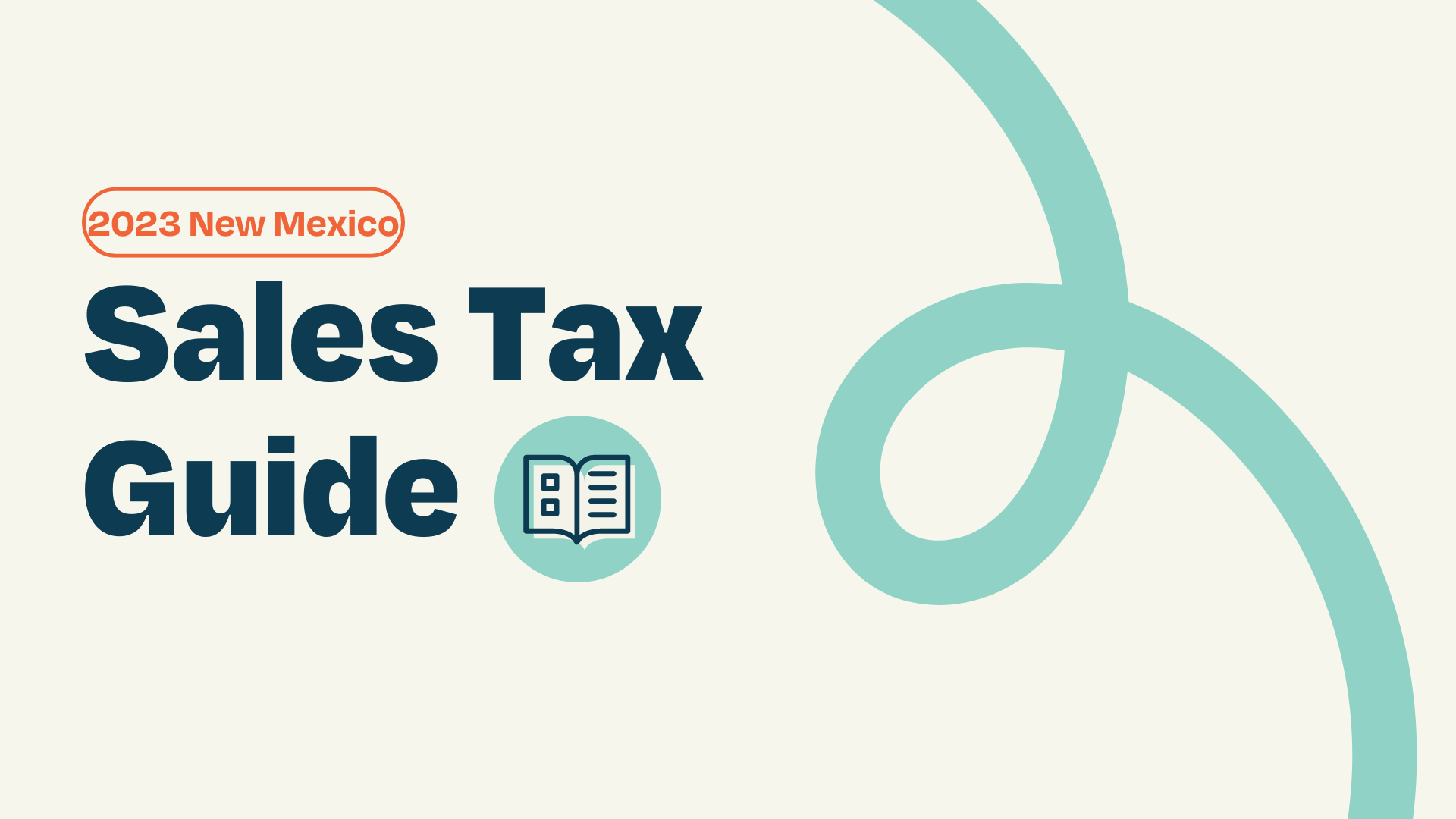Oklahoma 2023 Sales Tax Guide
Oklahoma Sales Tax in a Word Do you ever find yourself feeling a little overwhelmed when it comes to filing your Oklahoma sales tax returns?...

Navigating the world of sales tax can be a challenging journey, especially for busy small business owners. But fear not, fellow entrepreneurs! We've got your back with this comprehensive guide to help you master sales tax in the Land of Enchantment—New Mexico.
From understanding how to collect and manage sales tax, to filing and paying on time, we've got all the essential information you need, served with a side of light-hearted humor and friendly advice. So, buckle up and get ready to conquer sales tax with confidence, knowing that we're here to support you every step of the way.
In this guide, we'll cover everything from filing frequencies and exemptions to avoiding common mistakes and taking advantage of incentives. Let's dive in and make sales tax a breeze for your New Mexico business!
|
Table of Contents |
Navigating sales tax in New Mexico can be made easier by knowing the right authorities to contact when you have questions or need assistance. In this section, we'll introduce you to the agency responsible for managing sales tax in New Mexico and provide their contact information.
The New Mexico Taxation and Revenue Department (TRD) is the state agency responsible for administering and enforcing sales tax regulations, known as Gross Receipts Tax (GRT) in New Mexico.
To get in touch with the TRD for sales tax-related inquiries, you can use the following contact information:
|
Mailing Address |
P.O. Box 25126, Santa Fe, NM 87504-5126 |
|
Street Address |
1100 South St. Francis Drive, Santa Fe, NM 87505 |
|
Phone Numbers |
866) 285-2996 (toll-free) |
|
|
|
|
Website |
New Mexico Taxation and Revenue Department |
The TRD offers assistance with sales tax registration, filing, and payment, as well as providing information on sales tax rates, exemptions, and audit processes. Don't hesitate to reach out to the TRD with your questions or concerns—remember, they're here to help make your New Mexico sales tax experience as smooth as possible!
Before diving into the world of New Mexico sales tax, it's essential to determine if your business has a tax obligation in the state, known as "nexus." In this section, we'll explore the various factors that create sales tax nexus in New Mexico and touch on the state's use tax laws.
Sales tax nexus in New Mexico can be established through several factors, including physical presence, economic activity, affiliate relationships, click-through referrals, and marketplace facilitation.
A business has a physical nexus in New Mexico if it maintains a presence in the state through any of the following:
Owning or leasing property, such as an office, warehouse, or storefront
Having employees or representatives in the state
Storing inventory in the state (e.g., using a fulfillment center)
Effective July 1, 2019, New Mexico established economic nexus for remote sellers. A business has an economic nexus in New Mexico if, during the previous calendar year, it meets either of the following criteria:
Gross receipts from sales of tangible personal property, licenses, or services delivered into the state exceed $100,000
The business makes at least 200 separate transactions of tangible personal property, licenses, or services delivered into the state
Affiliate nexus in New Mexico occurs when a business has a relationship with an in-state entity that helps the out-of-state business establish or maintain a market in New Mexico. This may include activities such as advertising or promoting the out-of-state business's products or services.
New Mexico does not have specific click-through nexus laws. However, a business that generates sales through referrals from a New Mexico-based affiliate may still be considered to have nexus under the state's affiliate nexus provisions.
Effective July 1, 2019, New Mexico requires marketplace facilitators (e.g., Amazon, eBay) to collect and remit sales tax on behalf of their marketplace sellers if they meet the economic nexus thresholds mentioned above.
Yes, New Mexico imposes a use tax on tangible personal property purchased from an out-of-state seller and used, stored, or consumed in New Mexico if sales tax was not paid at the time of purchase. This tax is typically paid by the buyer, and businesses with a New Mexico tax permit must report and remit any use tax due on their gross receipts tax returns.
Before you start collecting sales tax in New Mexico, you'll need to register your business with the New Mexico Taxation and Revenue Department (TRD). In this section, we'll guide you through the registration process, discuss the costs, and explore additional agencies you might need to register with.
To register for sales tax in New Mexico, follow these steps:
Determine if you need a New Mexico tax identification number: If you have a business with a physical presence or economic activity in the state, you'll need a New Mexico tax identification number.
Gather the required information: Before you begin the registration process, make sure you have the following information on hand:
Business name and address
Federal Tax ID Number or EIN (if applicable)
Business structure (sole proprietorship, partnership, corporation, etc.)
Ownership and management information
Description of your business activities
Estimated start date for taxable activities in New Mexico
Register online or by mail: You can register for a New Mexico sales tax license either online or by mail. To register online, visit the New Mexico Taxpayer Access Point (TAP) and follow the instructions to create an account and complete the online registration. Alternatively, you can download the New Mexico Business Tax Registration Update (Form ACD-31015) from the TRD website, fill it out, and mail it to the address provided on the form.
Receive your New Mexico tax identification number: After processing your registration, the TRD will issue a New Mexico tax identification number (also referred to as a Combined Reporting System or CRS identification number). This number will be used to report and pay your gross receipts tax, compensating tax, and any other taxes you may be required to collect.
Display your sales tax license: Once you receive your sales tax license, you must display it prominently at your place of business.
There is no fee for registering for a New Mexico sales tax license.
Yes, if your business is structured as a corporation, partnership, or limited liability company (LLC), you will need a Federal Tax ID Number or EIN to register for a New Mexico sales tax license. If you're a sole proprietor with no employees, you can use your Social Security Number instead.
Depending on your business activities, you may need to register with additional agencies in New Mexico. These may include:
The New Mexico Secretary of State for business entity registration, trademarks, and trade names
The New Mexico Department of Workforce Solutions for unemployment insurance and workforce programs
The New Mexico Environment Department for environmental permits and compliance
It's essential to research your specific industry requirements and register with the necessary agencies to ensure your business complies with all state regulations.
Now that you're registered for sales tax in New Mexico, it's time to learn how to collect and manage it. In this section, we'll discuss whether New Mexico is an origin or destination sales tax state, what sales are subject to tax, taxability of Software as a Service (SaaS), exemptions, and handling exempt customers.
New Mexico is a destination-based sales tax state. This means that sales tax is based on the location of the buyer, not the seller. When shipping products to a customer within New Mexico, you should charge the sales tax rate applicable to the customer's destination, which includes the state, county, and local tax rates.
In New Mexico, the sales tax is known as the Gross Receipts Tax (GRT), which applies to most sales of goods and services. Some common examples of taxable sales include:
Tangible personal property (e.g., furniture, electronics, clothing)
Professional services (e.g., legal, architectural, accounting)
Leases and rentals of tangible personal property
Construction services
Utility services (e.g., electricity, natural gas, water)
Yes, SaaS is taxable in New Mexico. The New Mexico Taxation and Revenue Department defines SaaS as "a software licensing arrangement under which a customer subscribes to access a software application hosted by a vendor." Because SaaS is delivered electronically, it is considered taxable.
The following are some of the specific types of SaaS that are taxable in New Mexico:
Software as a service (SaaS): This includes software that is delivered over the internet and accessed by users through a web browser.
Cloud computing: This includes services that provide access to computing resources, such as storage, processing power, and networking, over the internet.
Web-based software: This includes software that is accessed through a web browser and does not require any installation on the user's computer.
If you are selling SaaS in New Mexico, you will need to collect sales tax on the sales. You can do this by registering for a sales tax permit with the New Mexico Taxation and Revenue Department.
Some goods and services are exempt from New Mexico sales tax. Common examples of exempt transactions include:
Sales of prescription drugs and certain medical equipment
Sales of groceries and food items for home consumption
Sales to government agencies and nonprofit organizations
Sales of textbooks to students attending New Mexico educational institutions
Services related to transportation, such as freight or passenger transportation
Some organizations and individuals may be eligible for sales tax exemptions in New Mexico, including:
Government agencies
Nonprofit organizations
Schools and educational institutions
Native American tribes
Agricultural producers for certain purchases
If you have a customer who is exempt from sales tax, they must provide you with a valid New Mexico Nontaxable Transaction Certificate (NTTC) or other documentation that verifies their exempt status. You should keep a copy of the certificate on file to support the exempt sale in case of an audit.
If you lose a customer's New Mexico sales tax exemption certificate, you should request a new copy from the customer as soon as possible. It's crucial to maintain accurate records of exemption certificates to ensure compliance with state tax laws and avoid potential penalties during an audit.
Once you've registered, collected, and managed sales tax in New Mexico, it's time to file and pay your sales tax returns. In this section, we'll cover the filing and payment schedule, handling due dates that fall on weekends or holidays, filing your sales tax return, potential penalties, and available sales tax incentives.
New Mexico sales tax returns are typically filed monthly, quarterly, or annually, depending on your business's sales volume. The filing frequency is determined by the New Mexico Taxation and Revenue Department (TRD) when you register for sales tax:
|
Monthly Filing |
If your business's average monthly tax liability is over $200, you will be required to file and pay your sales tax monthly. |
|
Quarterly Filing |
If your business's average monthly tax liability is between $50 and $200, you will be required to file and pay your sales tax quarterly. |
|
Annual Filing |
If your business's average monthly tax liability is less than $50, you will be required to file and pay your sales tax annually. |
If a New Mexico sales tax filing due date falls on a weekend or holiday, the deadline is extended to the next business day.
There are two main ways to file your New Mexico sales tax return:
File online: You can file and pay your sales tax return online through the New Mexico Taxpayer Access Point (TAP). To do this, log in to your TAP account, select the appropriate filing period, complete the electronic return form, and submit your payment using your bank account information or a credit card (note that credit card payments may be subject to a processing fee).
File by mail: If you prefer to file your sales tax return by mail, you can complete the New Mexico Combined Report (Form CRS-1) and mail it, along with a check for the tax due, to the address listed on the form. The form can be downloaded from the TRD website. Keep in mind that filing by mail may take longer to process compared to online filing, so be sure to mail your return well ahead of the deadline to avoid late penalties.
Regardless of the filing method you choose, it's essential to keep accurate records of your sales tax returns and payments in case of an audit.
In New Mexico, several penalties can be assessed for sales tax filing violations:
Late filing penalty: A penalty of 2% of the tax due will be assessed for each month (or part of a month) the return is late, up to a maximum of 20%.
Late payment penalty: A penalty of 2% of the unpaid tax will be assessed for each month (or part of a month) the payment is late, up to a maximum of 20%.
Negligence penalty: A penalty of 5% of the tax due can be assessed if the underpayment of tax is due to negligence.
Fraud penalty: A penalty of 50% of the tax due can be assessed if the underpayment of tax is due to fraud.
Interest: In addition to penalties, interest will be assessed on any unpaid tax from the due date until the date of payment.
New Mexico offers several sales tax incentives to encourage economic development and job growth within the state. Some of these incentives include:
Industrial Revenue Bonds (IRBs): Businesses involved in manufacturing, processing, or other eligible activities can benefit from reduced property taxes and sales tax exemptions on certain purchases through the issuance of IRBs.
High-Wage Jobs Tax Credit: Businesses that create new high-paying jobs in New Mexico may be eligible for a tax credit equal to 10% of the wages and benefits paid for each qualifying job.
Manufacturing Investment Tax Credit: Manufacturers in New Mexico can receive a tax credit equal to 5.125% of the value of qualified equipment and machinery purchased for use in their manufacturing operations.
To take advantage of these incentives, businesses must meet specific eligibility requirements and apply through the appropriate state agencies.
Filing sales tax returns can be a daunting task, but avoiding common mistakes can make the process smoother and help you stay in compliance with New Mexico tax laws. Here are five tips to help you prevent errors when filing your sales tax returns:
Stay organized with your sales records: Maintaining accurate and up-to-date records of all your taxable and exempt sales is crucial for filing accurate sales tax returns. Use a reliable accounting software or system to track your sales, exemptions, and tax rates, making it easier to complete your return and minimize errors.
Understand taxability rules: Familiarize yourself with New Mexico's taxability rules, including which goods and services are taxable, which are exempt, and the tax rates that apply to each. This knowledge will help you correctly calculate and report the tax due on your return.
File and pay on time: Late filing and payment can lead to penalties, interest charges, and even increased scrutiny from the tax authorities. Mark your calendar with the appropriate due dates based on your filing frequency (monthly, quarterly, or annually), and consider setting up reminders to ensure you file and pay on time.
Verify customer exemption certificates: If you have customers who are exempt from sales tax, make sure you have valid and up-to-date exemption certificates on file. Double-check the information on these certificates and ensure they are properly completed to minimize the risk of errors on your return.
Review your return before submitting: Before you submit your sales tax return, carefully review all the information for accuracy. Check your calculations, verify the correct tax rates have been applied, and ensure you've reported all taxable and exempt sales correctly. This final review can help you catch and correct any errors before submitting the return, minimizing the risk of penalties and interest charges.
By following these tips, you can avoid common mistakes when filing your New Mexico sales tax returns and stay in compliance with state tax laws. And remember, if you're unsure about any aspect of your sales tax obligations, it's always a good idea to consult with a tax professional or the New Mexico Taxation and Revenue Department for guidance.
And there you have it—a comprehensive guide to help you navigate the world of sales tax in New Mexico with confidence and ease. By now, you should have a solid understanding of the filing process, payment schedules, and valuable tips to avoid common pitfalls. Remember to stay organized, understand taxability rules, and keep up-to-date with any changes in tax laws and regulations.
As you continue on your small business journey, don't forget that we at Accountingprose are always here to support you and share our expertise. We believe in the power of partnership, and we're committed to helping your business flourish. If you ever find yourself in need of assistance or guidance, don't hesitate to reach out to our team of dedicated professionals.
So, go forth and conquer sales tax with the knowledge and tools you've gained from this guide. Here's to the success and growth of your New Mexico small business!
|
Ready to work with a New Mexico sales tax expert? We've love to work with you! |
|
Alaska Sales Tax Guide (N/A) |
||||
|
Montana Sales Tax Guide (NA) |
||||
|
Oregon Sales Tax Guide (N/A) |
||||
|
Delaware Sales Tax Guide (N/A) |
||||
|
New Hampshire Sales Tax Guide (NA) |
||||
And don't forget to check out our blog about Economic Nexus, which serves as an invaluable resource for businesses who have sales that are subject to sales tax.
This blog is for informational purposes only and the information is accurate as of 2023-06-19. If you want legal advice on sales tax law for your business, please contact a State and Local Tax (SALT) professional. Keep in mind that sales tax regulations and laws are subject to change at any time. While we strive to keep our blog current, this blog possibly may be out of date by the time you review it.

Oklahoma Sales Tax in a Word Do you ever find yourself feeling a little overwhelmed when it comes to filing your Oklahoma sales tax returns?...

Pennsylvania Sales Tax in a Word Hey there, fellow Pennsylvania business owners! We know that dealing with sales taxes can feel like...

Mississippi Sales Tax in a Word Embarking on the Mississippi sales tax journey can feel like navigating a maze filled with twists, turns, and...